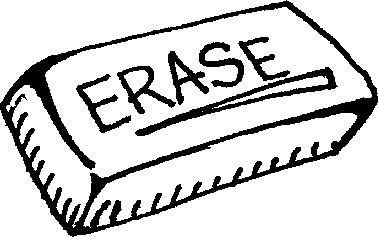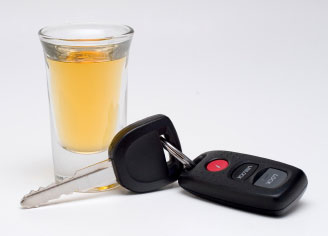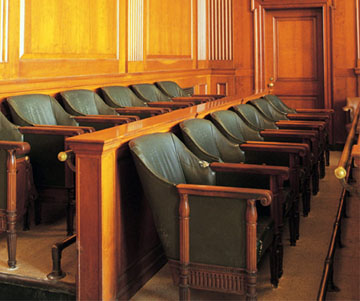Liability for Dog Bite Injuries
Friday, February 11th, 2011North Carolina law provides that the owner of a “dangerous dog” can be strictly liable for injuries from a dog bite under N.C. Gen. Stat. §67-4.4. In order to recover damages, the plaintiff must prove that the dog that bit them was a “dangerous dog.” N.C.G.S §67-4.1(a)(1) defines ‘dangerous dog’ as:
- A dog that:
- Without provocation has killed or inflicted severe injury on a person; or
- Is determined by the person or Board designated by the county or municipal authority responsible for animal control to be potentially dangerous because the dog has engaged in one or more of the behaviors listed in subdivision (2) of this subsection.
- Any dog owned or harbored primarily or in part for the purpose of dog fighting, or any dog trained for dog fighting. N.C.G.S. §67-4.1(a)(1)(d) provides exceptions for the following dogs from being classified as ‘dangerous dogs’ or ‘potentially dangerous dogs’ under the statute:

(1) A dog being used by a law enforcement officer to carry out the law enforcement officer’s official duties;
(2) A dog being used in a lawful hunt;
(3) A dog where the injury or damage inflicted by the dog was sustained by a domestic animal while the dog was working as a hunting dog, herding dog, or predator control dog on the property of, or under the control of, its owner or keeper, and the damage or injury was to a species or type of domestic animal appropriate to the work of the dog; or
(4) A dog where the injury inflicted by the dog was sustained by a person who, at the time of the injury, was committing a willful trespass or other tort, was tormenting, abusing, or assaulting the dog, had tormented, abused, or assaulted the dog, or was committing or attempting to commit a crime.
N.C.G.S § 67-4.1 provides that certain dogs may be classified as “potentially dangerous dogs” by a “Board designated by the county or municipal authority responsible for animal control.” N.C.G.S § 67-4.1(a)(2) also provides that the Board or a person should consider the following factors to determine if a dog is potentially dangerous:
- Inflicted a bite on a person that resulted in broken bones or disfiguring lacerations or required cosmetic surgery or hospitalization; or
- Killed or inflicted severe injury upon a domestic animal when not on the owner’s real property; or
- Approached a person when not on the owner’s property in a vicious or terrorizing manner in an apparent attitude of attack.
If a plaintiff is bitten by a “dangerous dog,” the owner of the dog may be held strictly liable for damages.
Negligence
Even if the dog is not determined to be a “dangerous dog,” one can still recover damages under the theory of negligence. To prove negligence, the plaintiff must show that the defendant was keeping an “animal with the knowledge of its viciousness.” Lee v. Rice, 154 N.C. App. 471, 472 (2002).
Under this theory, a plaintiff can recover compensation for their damages if they can prove two elements: “(1) that the animal was dangerous, vicious, mischievous, or ferocious, or one termed in law as possessing a vicious propensity; and (2) that the owner or keeper knew or should have known of the animal’s vicious propensity, character, and habits.” Lee v. Rice, 154 N.C. App. 471, 472 (2002). (quoting Sellers v. Morris, 233 N.C. 560,561 (1951).)
Negligence Per Se
Negligence per se may apply if the owner or keeper of the dog had violated a local ordinance or state law. In Swaney v. Shaw, the court found that ‘the violation of a statute which imposes a duty upon the defendant in order to promote the safety of others, including the plaintiff, is negligence per se, unless the statute, itself otherwise provides.’ 27 N.C. App. 631, 635 (1975). (quoting Ratliffe v. Power Co., 268 N.C. 605, 610 (1966).)
Many counties and cities have local laws regarding dangerous dogs. N.C.G.S. § 130A-200 provides that: “A local health director may declare an animal to be vicious and a menace to the public health when the animal has attacked a person causing bodily harm without being teased, molested, provoked, beaten, tortured or otherwise harmed. When an animal has been declared to be vicious and a menace to the public health, the local health director shall order the animal to be confined to its owner’s property. However, the animal may be permitted to leave its owner’s property when accompanied by a responsible adult and restrained on a leash.”
If you have sustained injuries after having been bitten by a dog or other dangerous animal, call Collins Law Firm for a consultation at 910-793-9000. We have represented victims of dog bites and recovered money damages for our clients, and we will be happy to talk with you about your case.

 The recent snow storm in the east coast caused school closings and court closings in Southeastern North Carolina including New Hanover, Brunswick, Pender, Columbus, Bladen, Sampson, Duplin, and Onslow Counties. The criminal and traffic charges which were set for the days court was closed are continued to the next court day for the charging officer. Most people with court dates which were set for the days court was closed will be notified by the clerk’s office about their next court date. Defendant’s with lawyers should consult with their attorney about their next court date.
The recent snow storm in the east coast caused school closings and court closings in Southeastern North Carolina including New Hanover, Brunswick, Pender, Columbus, Bladen, Sampson, Duplin, and Onslow Counties. The criminal and traffic charges which were set for the days court was closed are continued to the next court day for the charging officer. Most people with court dates which were set for the days court was closed will be notified by the clerk’s office about their next court date. Defendant’s with lawyers should consult with their attorney about their next court date. Anyone can be charged with a crime, and many people are wrongfully accused. Just because someone has been charged does not mean they are guilty. Criminal charges, even wrongful criminal charges, result in criminal records which can affect people for their entire life. Therefore, it is very important that people who are charged take the matter seriously and take appropriate steps to avoid or mitigate the negative consequences of criminal charges. In some cases, it is possible to have criminal records expunged which means the official public records are removed and destroyed by a process called expungement or expunction.
Anyone can be charged with a crime, and many people are wrongfully accused. Just because someone has been charged does not mean they are guilty. Criminal charges, even wrongful criminal charges, result in criminal records which can affect people for their entire life. Therefore, it is very important that people who are charged take the matter seriously and take appropriate steps to avoid or mitigate the negative consequences of criminal charges. In some cases, it is possible to have criminal records expunged which means the official public records are removed and destroyed by a process called expungement or expunction. The holidays are upon us and most people are attending holiday parties and other holiday events. Many of these events offer alcohol and law enforcement is aware of that fact. Enforcement of traffic laws are often increased during holidays and this season is no exception. Last week alone, for example, there were over 70 people charged with driving while impaired (DWI/DUI) in New Hanover County, NC.
The holidays are upon us and most people are attending holiday parties and other holiday events. Many of these events offer alcohol and law enforcement is aware of that fact. Enforcement of traffic laws are often increased during holidays and this season is no exception. Last week alone, for example, there were over 70 people charged with driving while impaired (DWI/DUI) in New Hanover County, NC.  North Carolina’s New Motor Vehicles Warranties Act (§§ 20-351 – 20-353), also known as North Carolina’s Lemon Law (and federal Lemon Laws such as the Magnuson-Moss Warranty Act) provide for compensation for purchasers of defective vehicles. To qualify for relief under North Carolina’s Lemon Law, you must have purchased a new vehicle that has had multiple repair attempts under the manufacturer’s factory warranty, and it must be “seriously defective” and cannot be repaired in a “reasonable number of attempts.”
North Carolina’s New Motor Vehicles Warranties Act (§§ 20-351 – 20-353), also known as North Carolina’s Lemon Law (and federal Lemon Laws such as the Magnuson-Moss Warranty Act) provide for compensation for purchasers of defective vehicles. To qualify for relief under North Carolina’s Lemon Law, you must have purchased a new vehicle that has had multiple repair attempts under the manufacturer’s factory warranty, and it must be “seriously defective” and cannot be repaired in a “reasonable number of attempts.” Traffic tickets can be a lot more expensive than the fine and court costs stated on the ticket. For most traffic tickets, if you just pay off the ticket, you will be convicted of the charge, and you will be assessed points both on your driver’s license and on your insurance policy. Insurance points can be very expensive. They cause your insurance premiums to increase for three years, and for most policies, that will add up to thousands of dollars. Details about insurance points and the percentage of premium increases can be found
Traffic tickets can be a lot more expensive than the fine and court costs stated on the ticket. For most traffic tickets, if you just pay off the ticket, you will be convicted of the charge, and you will be assessed points both on your driver’s license and on your insurance policy. Insurance points can be very expensive. They cause your insurance premiums to increase for three years, and for most policies, that will add up to thousands of dollars. Details about insurance points and the percentage of premium increases can be found  Employees who are laid off, or terminated through no fault of their own may qualify for unemployment compensation. Unemployment benefits are administered by the Employment Security Commission (ESC). To receive unemployment benefits, a former employee must file a claim with the ESC, and meet eligibility requirements. To be eligible for benefits, you must be unemployed through no fault of your own, be able and available for work and be actively seeking work. You may be disqualified from receiving benefits if you were discharged from work due to work “misconduct,” such as use of alcohol or drugs, fighting, unauthorized absences without good cause or theft of company property. You may also be disqualified if you are terminated for a reason that does not constitute misconduct, but is considered a “substantial fault.” Substantial fault includes acts, over which you have reasonable control, that violate reasonable job requirements.
Employees who are laid off, or terminated through no fault of their own may qualify for unemployment compensation. Unemployment benefits are administered by the Employment Security Commission (ESC). To receive unemployment benefits, a former employee must file a claim with the ESC, and meet eligibility requirements. To be eligible for benefits, you must be unemployed through no fault of your own, be able and available for work and be actively seeking work. You may be disqualified from receiving benefits if you were discharged from work due to work “misconduct,” such as use of alcohol or drugs, fighting, unauthorized absences without good cause or theft of company property. You may also be disqualified if you are terminated for a reason that does not constitute misconduct, but is considered a “substantial fault.” Substantial fault includes acts, over which you have reasonable control, that violate reasonable job requirements. If you are summoned for jury duty, it is important that you comply with the requirements of the summons. Report to the bailiff of the proper court on the date and at the hour stated in your summons. In
If you are summoned for jury duty, it is important that you comply with the requirements of the summons. Report to the bailiff of the proper court on the date and at the hour stated in your summons. In  If you are involved in a car crash or automobile accident through no fault of your own, and you are injured, it is critical that you seek medical attention immediately. If emergency medical services are called to the scene, they can help you determine whether or not you need to be transported by an ambulance or if it would be safe for you to seek alternative transportation to the hospital. Many times, people can sustain injuries which are not immediately apparent and for which the symptoms may not occur until a later time. All reasonably necessary medical expenses for injuries caused by the accident should be covered by the insurance carrier for the person who caused the accident. In addition to paying for medical expenses, they can pay for any other expenses caused by the accident and for pain and suffering for injuries caused by the accident.
If you are involved in a car crash or automobile accident through no fault of your own, and you are injured, it is critical that you seek medical attention immediately. If emergency medical services are called to the scene, they can help you determine whether or not you need to be transported by an ambulance or if it would be safe for you to seek alternative transportation to the hospital. Many times, people can sustain injuries which are not immediately apparent and for which the symptoms may not occur until a later time. All reasonably necessary medical expenses for injuries caused by the accident should be covered by the insurance carrier for the person who caused the accident. In addition to paying for medical expenses, they can pay for any other expenses caused by the accident and for pain and suffering for injuries caused by the accident.